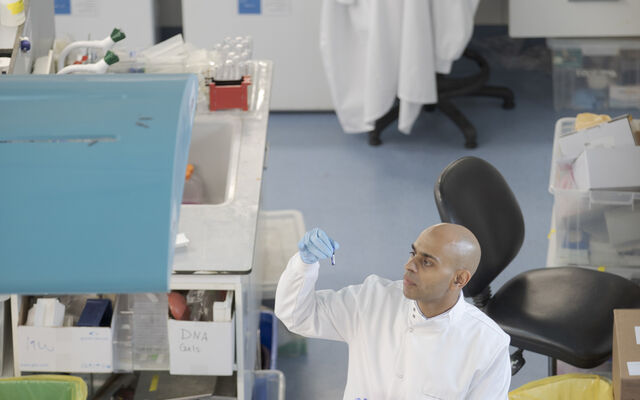
How could our DNA make us susceptible to autoimmune disease?
Autoimmune diseases are a group of disorders which cause the immune system to mistakenly attack the body’s healthy cells, tissues and organs.
There are over 80 different types of autoimmune disease that we know of, including lupus, multiple sclerosis (MS), rheumatoid arthritis, diabetes type 1, inflammatory bowel disease (IBS), eczema, psoriasis and many others.
Recent studies estimate that one in ten people in the UK have an autoimmune disorder. This includes:
- Over 130,000 people with MS in the UK
- More than 400,000 people in the UK with rheumatoid arthritis
- More than 10% of the UK’s population thought to have IBS
Autoimmune conditions are often difficult to diagnose. There's usually not a specific test to show whether you have a certain autoimmune disease and the symptoms can appear similar to other conditions.

Dr James Peters from Imperial College London has published a recent paper in Nature Immunology showing how genetic factors influence the levels of proteins in the blood which are related to inflammation and disease.
Dr Peters’ team conducted a large study in which they looked at the blood of over 15,000 people. This is one of the biggest studies to-date which looks at these specific proteins in inflammatory disease.
The team found 180 genetic variants that affect the levels of these proteins, 50 of which were previously unknown.
The researchers carried out a meta-analysis to get a better understanding of how these proteins are involved in diseases. They found that one protein, called lymphotoxin-alpha, may play a role in MS. They also found that the protein CXCL5 may be related to ulcerative colitis (a form of IBS).
They also discovered that some specific proteins have different effects on different autoimmune diseases. For example, the protein CD40 plays a role in rheumatoid arthritis, MS, and IBS, but its effects on these diseases are not the same. This means that targeting CD40 might be helpful for treating one of these diseases, but harmful for another.
“If we understand causes of disease, we're much more likely to be able to develop drug treatments. Our motivation is really understanding those pathways that drive disease risk, and then being able to put that information out there to be used to select drug targets.” Dr James Peters
All this data builds our understanding of predisposing factors to developing various autoimmune diseases. Realistically, it can take years from having the idea to target a pathway to a drug actually coming into clinical practice. But the big hope is that this data will provide the basis for new treatments.Dr James Peters
The researchers used a technique called Mendelian randomization - this helps researchers determine whether a particular factor, like a protein in this case, is actually causing a disease or if it's just a marker of the disease.
The team identified pathways that are already targeted by existing drugs to confirm the drug’s usefulness. They also found new potential targets for therapies that could be developed in the future.
Overall, this study is a significant step forward in our understanding of the genetic factors that influence inflammation and autoimmune diseases, and could help identify new potential targets for new treatments and therapies.
“This funding enabled me to take on a leadership role of this project within the consortium, so it has been really helpful.” - Dr James Peters

Fund more research like this
Many of the diseases and conditions that affect us as humans have been overcome as a result of medical research. But some areas of health are in desperate need of support.
Donate


